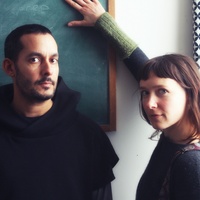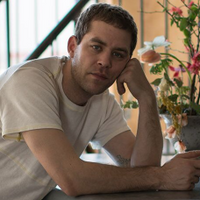As told to T. Cole Rachel, 2294 words.
Tags: Music, Process, Adversity, Failure, Creative anxiety.
On the value of starting over
Musicians Arone Dyer and Aron Sanchez—better known as Buke and Gase—discuss scrapping an entire album of material, harnessing the creative energy of improvisation, and why sometimes it’s good to hit the reset button.You have a new record coming out this year. As I understand it, you scrapped what was essentially a finished record before making Scholars. What happened? And how did you know that you needed to stop and start all over?
Arone Dyer: I’m trying to remember if that’s one of those things that nearly broke the band up. [laughs] We were stressed out. We weren’t agreeing on the album.
Aron Sanchez: We didn’t communicate about it properly.
Arone: We didn’t communicate about it and then kind of just kept going along with this like, “Yeah, we’re doing this album, it’s fine” and supporting it.
Aron: And the deadline was pretty tight. It felt like we needed to have something. It felt really good when we were finally like, “Oh, let’s not release it.”
Arone: Yeah, for both of us.
Aron: It was the day that we had to hand it in. We made the decision.
Arone: I think you called me. He was like, “Hey. How do you really feel about this?”
Aron: And then we got together and talked about it.
Arone: And we agreed. It was a relief. I felt much better.
Aron: Making these two records, in a way, it was all about process. It was all about us figuring out how to make the record that we actually wanted to make.
Arone: And learning how to work together.
Aron: It was a lot of trial and error. We had to go through the failure first in order to figure out, “Oh, wait a minute, we need to do it this way.” But even then it wasn’t an immediate fix. It wasn’t like, “Oh, this is what we did wrong and this is what we have to do to make it right.” It was like, “This is what went wrong,” and then we had to find the solution. And eventually we found it. It was kind of staring us in the face the entire time.
What was the issue? Was it an issue of miscommunication?
Arone: I don’t know if we have that problem so much because it’s just the two of us so. Oftentimes we’re like, “Well, this is how I feel about it, it’s clearly not working,” or “This works really well,” so I think we communicate as much as we can. And we’re usually spot on.
Aron: Yeah. I think with the record that didn’t work, it was just fundamentally not working out, but we knew we had to get it done by this specific time and some of it was fine. I think we were generally depressed about the whole thing but just getting through it because we were like, “Well this kinda works.” You know what I mean?
Arone: It’s what we have to do. We have to finish it.
Aron: But then at the end of the day we realized the fundamental problems. It didn’t feel good at all, but once we acknowledged that the record didn’t work and talked about it, things felt better. We pared the whole thing down to one single, “Seam Esteem,” and released that instead. So something survived.
Bands can get trapped within the cycle of “putting out a record so you can go on tour so you can make a new record so you can go on tour.” When this is your creative practice and your livelihood, things can get complicated. The pressure to finish something and turn it in so you can get back into that cycle can be intense, I imagine.
Arone: That was huge. Yeah.
Aron: I mean, we were trying to get a record done from the time General Dome was released in 2013 until we made the new record. We were trying to do it quickly. But at the same time, we were also trying to reinvent ourselves. I think that’s where we fucked up, because we were trying to do something new that was like a progression of what we were trying to do before, but we didn’t give ourselves enough time to do that.
Arone: We also changed practice spaces during that time, which is huge. We went from working at the Basilica in Hudson to a space at Second Ward. It was a very different kind of space for us to be in and I think that affected how we were working and what was coming out of us. I mean, we had carpet under us all of a sudden.
Arone: It changes your relationship with sound. Incredibly. So as opposed to being in a very cacophonous open space, which we had during the making of General Dome, we were working in a much different closed-in space.
Aron: In hindsight, I feel like there were two big hurdles. We were trying to evolve our sonicscape—going from using these few instruments we were dealing with up to that point and moving to something more broad. We were trying to figure out how to do that while we were also trying to figure out how to write music. We were still fighting a lot with ourselves.
Aron: It became difficult agreeing on stuff and trying to get at the kind of material we wanted. Everything was getting too contrived and too intentional. So, learning how to break from that was important, and so hard to do.
As hard as it was, it’s great that you had the wherewithal to put on the brakes. There’s nothing worse than not doing that and then having to go out on the road in support of something you don’t feel good about. It’s no fun to put something out in the world and then spend the rest of your life looking back and thinking, “I wish we hadn’t done that.”
Aron: Yeah, after we did that, a friend of ours was like, “Aww man, more bands should do that.” But at the time it was hard.
For Scholars you changed things in terms of the gear you’re using and the way you play. Did that affect your methodology in terms of how you think about making songs?
Aron: Yes. Improvisation has always been a part of what we do, but now it’s become more of a matter of how we utilize the improvisation. At a certain point we realized that we’re bad at sitting down and writing a song together because we too get heady, and it feels too contrived. We fight too much.
Arone: We start owning certain parts and then that becomes a weird thing.
Aron: Ego comes in. Since we’re just two people, it’s easy to sit down and improvise. So we record it all and then go back and reference the improvised recordings to create songs, then edit the parts together or whatever. Then we would re-play, or re-learn it, and then it’s kind of like we’re learning someone else’s music. Yes, we know how to do it because we played it originally, but often I’m like, “I don’t remember doing that, that’s cool!” It takes a lot of the pressure away. You feel somehow unattached to it, and it’s not so controlled.
Arone: That’s the more recent thing that we’ve discovered for ourselves. We really have to work in a very improvised fashion.
Aron: We’re just reacting in real time, which provides some freedom. The record that we didn’t release, what made it fail is that we were still trying to control things too much. We would record our improvise, but they were just sketch recordings—just a two-track recording, or whatever. Then we’d go back and we’d find the song in there, then we would play it, or re-learn it, and then produce it.
Arone: We’d hash it out, but ultimately we’d change things about it that probably didn’t need to be changed.
Aron: So we would get really excited to go back to this space of writing together and somehow it would turn into something we weren’t feeling. We would go back and listen to the original sketch, the improv thing and go, “That sounds amazing. Why can’t we do that?”
Arone: Yeah, how come we can’t make it work and have it feel the same?
Aron: So on our way to making Scholars, we discovered that we needed to multi-track while we’re improvising, so that the improv is the record. It is the original. So we did that, but at first we still weren’t totally registering that the improv recordings were the actual record. We were still dealing with the old process—thinking we’d take these recordings and somehow redo them—and then at one point we were like—why don’t we just really sit down and listen to these and maybe that is the record? The record is already in there. And that’s what we did.
Arone: We were talking about people like Brian Eno. Those guys just fucking improvised albums. Why can’t we do that? We weren’t saying we’d do that same thing exactly, but that was a reference.
Aron: So then we just started cutting it up and putting things together, and using whole sections. And then, because we had everything on multi-tracks, we could mute the vocal track and then Arone could go back and write new stuff or create different lyrics based on what things sounded like. So most of this record is a result of that. All the backing tracks are just the improv sessions. And then we put the new vocals on top.
Arone: And the occasional overdub of things, but now I can’t remember what.
How has the sonic palette you’re working with changed?
Arone: We’ve added synth. A lot of synth.
Aron: We were using the computer a lot. It’s still all live, the way we play, but we’re doing a lot of triggering with samples and stuff. So yeah, the computer is a new addition. I still have the bass drum but it’s mostly a drum trigger at this point. I can either have it sound like a drum or I can have it sound like something else. Sometimes it’s not just a single sound, but a couple of notes. I can use it to create a rhythm. On some songs we’re not using our old instruments—the buke and gase—at all.
Arone: Sometimes I’m just singing, which is weird.
Did you feel trapped in a particular way of playing before? That can make it a little less fun.
Arone: I don’t know. I always have fun. I get lost in it. Sometimes I realize I’m thinking about something else and the words are still coming out.
Aron: Over time I wanted to be able to do different things, especially with my role. I’m playing the drums. I don’t know how familiar you are with our set up, but I am playing the drum, playing the bass… I’m basically the rhythm section. I would feel like I’m locked into this thing.
Arone: Yeah. Same here. That’s why we’re working on changing our approach. Finding ways to be able to stand up is huge. Finding ways we can just get away from the computer but still maintain—I don’t want to say control necessarily—but it is maintaining control over each piece at a time. All the triggers, all the sounds. It’s an evolving process, which is a nice way to look at it.
You’ve been doing this project for a long time now. How difficult has it been to navigate the business side of things? To deal with labels and publicists and promotion?
Arone: It sucks. [laughs]
Aron: I mean, we’re not so good at it.
Arone: I cannot stand the fact that we have to do social media. I understand it—like yeah, you wanna promote yourself—but it’s also terrible. People used to pay publicists to do that. Now you are expected to do that stuff yourself and spend time thinking about it.
Aron: But at the same time it’s cool that we can be in control of that. You know? It just takes a lot of time.
Arone: Yes, but wouldn’t you so much rather be making music and continuing to make music?
Aron: Yeah. I know. It’s a time suck.
Arone: It’s a total time suck. And it’s stressful. And also, I would like to consider myself a humble person. I don’t really feel comfortable throwing myself out there. I have a difficult time with it. Also, I’m more of a private person than it seems like half of our population and half of our society is at this point. It’s definitely something I have been working on because I understand the importance of it. It also just bums me the fuck out.
Aron: But we’re trying to work on it.
Arone: Yes. We’re trying to work on it. Like everything else, it’s a process.
Buke and Gase recommend:
Arone: I just began reading Emergent Strategy by Adrienne Maree Brown. The book talks about working towards something greater, a greater goal, by getting really deep individually and creating a deep relationship with one or two people and making that be the biggest focus of your life. It’s very intense. I’ve been listening to Lily and Horn Horse and Thundercat and Georgia Anne Muldrow.
Aron: I’ve been getting really into Umm Kulthum. She’s an Egyptian singer from like the 50’s, 60’s, 70’s and she made the most amazing recordings. She’ll have a full orchestra and percussion and I think most of the records are live concerts. They just have this amazing sound. It’ll be this big orchestral opening thing will happen and then you hear this huge applause when she comes onstage and starts to sing. It’s so good.




